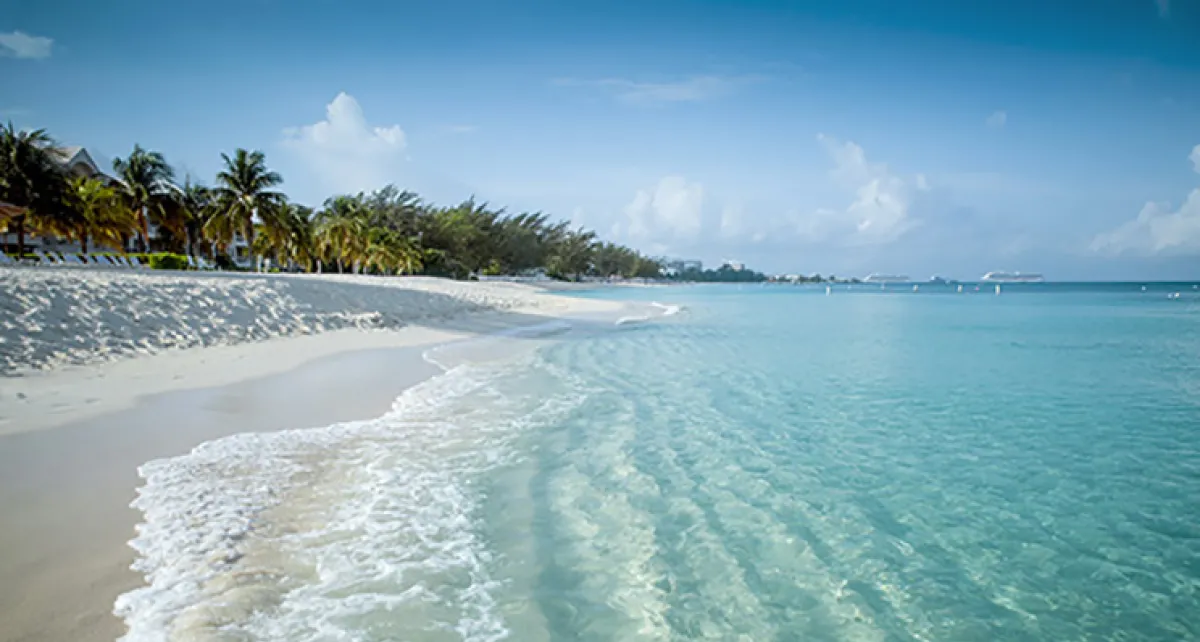
The case for Cayman Islands funds
开曼群岛作为基金司法管辖区的特点和优势
In this article, Carey Olsen Singapore head of funds, Tom Katsaros, and senior associate, Wei Xun Toh explore why the Cayman Islands remains a top choice for fund domiciliation among global fund managers.
An original version of this article was first published by The Alternative Investment Management Association (AIMA), November 2024
Over the past 30 years, the Cayman Islands has been the pre-eminent jurisdiction for the formation of alternative investment funds, with a strong track record of over 30,000 registered funds with the Cayman Islands Monetary Authority (approximately 13,000 regulated open-ended funds and 17,000 regulated closed-ended funds). This achievement consolidates the Cayman Islands’ position as the world’s leading funds jurisdiction, with further growth expected in the coming years.
According to Cayman Finance, the current projections indicate the 2024 year-end total will surpass 2023’s registrations, building on the steady growth of private funds since the introduction of the Private Funds Act in 2020. Last year saw 16,551 private funds, the previous high for registrations, along with 12,802 as the prior high for mutual funds registrations.
This article will seek to highlight why the Cayman Islands continue to go from strength to strength, while substantiating the reasons why more fund managers across the globe seek to domicile their funds in the Cayman Islands.
Political and economic stability and sound legal system
As a British Overseas Territory, the Cayman Islands enjoy political and economic stability. The jurisdiction’s legal system is based on established English common law. Corporate and commercial statutes are continually being revised and improved in response to the demands of international commerce. The courts function effectively and smoothly and employ an investor-friendly and creditor-friendly approach. The final court of appeal is the Privy Council in London. The judiciary is sophisticated and many of the attorneys at Cayman Islands law firms have been sourced from top-tier international law firms. The Grand Court in the Cayman Islands also has a specialist division, the Financial Services Division, which is designed to focus on complex financial services matters and commercial litigation.
Speed of formation
Cayman Islands companies and limited partnerships can generally be formed on a same-day basis and the certificate of registration and other stamped documents will generally be issued by the Cayman Registrar’s office that day (if the entity is registered on an express basis).
Tax neutrality and absence of exchange controls
There are currently no forms of direct taxation in the Cayman Islands (i.e. no income, inheritance, gift, withholding, corporate or capital gains taxes) and no forms of exchange control. In addition, it is possible, but not obligatory, for exempted companies, limited liability companies, limited partnerships and trusts to order a tax exemption certificate, which provides comfort that future changes in the law will not result in that entity being subject to taxation in the Cayman Islands for a period of either 20 years (company) or 50 years (limited partnership, limited liability company or trust). In light of the tax neutrality, some have mistakenly coined the Cayman Islands a “tax haven” when, in fact, it imposes substantive indirect tax in the form of import duties and stamp duty.
Anti-money laundering regime
The Cayman Islands has a strong anti-money laundering regime and is committed to complying with its international obligations. It has signed a large number of tax information exchange agreements with other countries and territories and is on the OECD ‘whitelist’ of compliant jurisdictions. Having been removed from the Financial Action Task Force’s Grey List in October 2023 and the European Union’s Anti-Money Laundering blacklist in February 2024, it is a further recognition of the Cayman Islands’ robust AML/CFT regime and its commitment to adhering to international standards.
Cayman Islands Monetary Authority (CIMA)
CIMA oversees the regulation and supervision of financial services, the monitoring of compliance with money laundering regulations, and has issued regulatory handbooks on policies and procedures, rules and statements of principle and guidance applicable to regulated funds in the Cayman Islands. CIMA adheres to recognised international standards while at the same time ensuring that regulation is both necessary and proportionate. CIMA is a member of the International Organization of Securities Commissions, the principal global standard setting body for the regulation of securities markets. CIMA enjoys a close working relationship with, and regularly consults with, the private sector in developing a bespoke fund legislation over the years which is easy to understand and in line with global standards.
Enforcement of foreign judgments
A judgment obtained in a foreign court will generally be recognised and enforced in the courts of the Cayman Islands at common law, without any re-examination of the merits of the underlying dispute, by an action commenced on the foreign judgment debt in the Grand Court of the Cayman Islands, provided that such judgment:
- Is given by a foreign court of competent jurisdiction;
- Imposes on the judgment debtor a liability to pay a liquidated sum for which the judgment has been given;
- Is final and conclusive as between the parties thereto;
- Is in respect of a fixed sum of money and not for a tax, fine or penalty; and
- Was not obtained by fraud or in proceedings contrary to natural justice and its enforcement is not contrary to the public policy of the Cayman Islands.
There is also direct statutory enforcement of judgment obtained in certain courts in Australia.
Arbitration
The courts of the Cayman Islands will generally recognise and enforce arbitral awards made pursuant to an arbitration agreement in a jurisdiction which is party to the United Nations Convention on the Recognition and Enforcement of Foreign Arbitral Awards unless one of the defences set out in section 7 of the Foreign Arbitral Enforcement Act (as revised) of the Cayman Islands can be established. In addition, the Arbitration Act (as revised) of the Cayman Islands (which provides a unitary regime of arbitration largely based on the UNCITRAL Model Law on International Commercial Arbitration) has also established the jurisdiction as a desirable place in which to conduct international arbitrations.
‘Onshoring’ vs ‘Offshoring’
In recent times, market observers in certain jurisdictions like Singapore, Hong Kong and Luxembourg have seen a rise in the uptake of ‘onshore’ vehicles by fund managers looking closer to home due to the enhancement of anti-financial crime measures globally along with the introduction of new fund structures and incentives to boost the asset management industry in such ‘onshore’ jurisdictions. Notwithstanding this observation, we nonetheless see a growing popularity and demand for Cayman Islands investment funds utilised throughout Asia. It is indeed not a ‘zero-sum’ game where managers choose to domicile their funds in only one jurisdiction to the exclusion of others. As fund managers deal with increasingly sophisticated investors from multiple jurisdictions and more complex regulatory environments for foreign investments, we are observing structures in different jurisdictions often used in tandem with each other to achieve different objectives.
From a Singapore and South East Asian perspective, we typically see a wide range of structures being utilised by managers which include Cayman Islands vehicles as either (i) the main fund, (ii) the feeder fund which in turn invests into an ‘onshore’ master fund vehicle (e.g., a Singapore variable capital company (VCC)) or an Australian unit trust), (iii) a parallel fund vehicle which invests alongside an ‘onshore’ vehicle, or (iv) in a purely Cayman Islands ‘master/feeder structure’.
Conclusion
For the above reasons, the Cayman Islands continues to grow and build on its stellar reputation as the world’s pre-eminent funds jurisdiction over the last 30 years. That said, fund structuring is a multi-faceted process which should consider a wide range of factors, including but not limited to tax planning, commercial flexibility and investor familiarity. With increasingly complicated regulatory environments and cross-border investment considerations, the flexibility of the Cayman Islands regime ensures it will remain at the forefront of the global funds industry.
Please reach out to your usual Carey Olsen contact, or one of the contacts listed in this article, if you require further guidance in relation to the above.
本文最初版本于 2024 年 11 月由《AIMA 期刊》(AIMA Journal)(版次:140)首次发表。
过去三十年来,开曼群岛已成为另类投资基金的知名司法管辖区,有三万多支基金在开曼群岛金融管理局 (Cayman Islands Monetary Authority,简称"CIMA") 注册(约一万三千支受监管的开放式基金和一万七千支受监管的封闭式基金)。这一成就巩固了开曼群岛作为全球领先基金司法管辖区的地位,预计未来几年,该地区的地位将进一步提升。
开曼群岛金融服务组织 (Cayman Finance) 表示,根据当前的预测,到 2024 年底,注册基金总数将超过 2023 年,取得这一成就离不开自 2020 年《私募基金法》出台以来私募基金的稳步增长。去年共有 16,551 支私募基金注册,创下历史新高,同时有 12,802 支共同基金注册,同样创下历史新高。
本文旨在分享开曼群岛的实力能够不断增强的原因,同时证实全球越来越多的基金管理人寻求在开曼群岛注册基金的理由。
政治、经济稳定,且法制健全
作为英国海外领土,开曼群岛的政治、经济稳定。该司法管辖区的法律体系建立在既有的英国普通法的基础之上。企业和商业成文法在不断修订和完善,确保能够满足国际商务的需求。法院高效、平稳运作,采用的方法也能保障投资者和债权人的利益。最终上诉法院是伦敦的枢密院。司法体系非常完善,且开曼群岛律所的许多律师都是从顶尖国际律所招揽过来的人才。开曼群岛大法院还设有一个专业分庭,即金融服务分庭。开设该法庭旨在专门解决复杂的金融服务事务和商业诉讼。
成立速度快
开曼群岛公司和有限合伙企业通常可以在同一天成立,如果该实体选择加急注册,开曼群岛注册处通常当天就可以签发注册证书和其他加盖印章的文件。
采用税收中性原则,且不实施外汇管制
开曼群岛目前不以任何形式直接征税(即不征收所得税、遗产税、赠与税、预扣税、公司税或资本利得税),也不实施任何形式的外汇管制。此外,豁免公司、有限责任公司、有限合伙企业和信托可以请求签发免税证书(但并非必须之举),这一举措可以让这些实体不必担心未来法律发生的任何变动会导致自己在开曼群岛承担长达二十年(公司)或五十年(有限合伙企业、有限责任公司或信托)的纳税义务。考虑到开曼群岛采用税收中性原则,有些人会误认为开曼群岛是“避税天堂”,但事实上,它仍会以进口税和印花税的形式征收实质性的间接税。
反洗钱制度
开曼群岛实施了强有力的反洗钱制度,并致力于履行其国际义务。开曼群岛已经与其他国家和地区签订了大量《税务信息交换协议》,并被列入经合组织 (OECD) 的合规司法管辖区“白名单”。开曼群岛于 2023 年 10 月从反洗钱金融行动特别工作组 (FATF) 的灰名单中被除名,并于 2024 年 2 月从欧盟的反洗钱黑名单中被除名,这无疑是对开曼群岛健全的反洗钱与反恐怖主义融资 (AML/CFT) 制度,以及遵守国际标准的承诺的进一步认可。
开曼群岛金融管理局 (CIMA)
CIMA 负责监管和监督金融服务,以及监控洗钱法规的合规情况,并就适用于开曼群岛受监管基金的政策及规程、规则、原则声明和指南发布了监管手册。CIMA 遵守公认的国际标准,同时确保其监管既出于必要又相称。CIMA 加入了国际证券委员会组织,该组织是制定证券市场监管标准的全球主要机构。多年来,CIMA 与私营业界密切合作,并定期与之协商,共同制订易于懂且符合全球标准的专门基金法律。
强制执行外国判决
外国法院下达判决的当事人通常可以根据普通法,在开曼群岛大法院就外国判决债务提起诉讼,从而让开曼群岛法院认可并强制执行该等判决,无需重新审查原始争议的案情,前提是该等判决符合以下情况:
由主管司法管辖区的外国法院下达;
要求判决债务人支付已作出判决的清偿款项;
在判决当事人之间是最终判决,具有决定性;
涉及固定金额,而非税款、罚款或处罚;以及
并非通过欺诈或违反自然正义原则的诉讼程序获得,其强制执行也不会违反开曼群岛的公共政策。
此外,澳大利亚特定法院下达的判决也可以直接依法强制执行。
仲裁
如果仲裁裁决是根据在签署《联合国关于认可并强制执行外国仲裁裁决的公约》(United Nations Convention on the Recognition and Enforcement of Foreign Arbitral Awards)的司法管辖区内达成的仲裁协议作出,开曼群岛法院通常会认可并强制执行该等仲裁裁决,但能够确立开曼群岛《外国仲裁强制执行法》(经修订)(Foreign Arbitral Enforcement Act (as revised))第七条规定的任一抗辩的情形除外。此外,开曼群岛的《仲裁法》(经修订)(Arbitration Act (as revised) )(主要基于《联合国国际贸易法委员会国际商事仲裁 (UNCITRAL) 示范法》提供了一个统一的仲裁制度)也将该司法管辖区确立为进行国际仲裁的理想仲裁地。
“在岸”与“离岸”
近年来,新加坡、中国香港和卢森堡等特定司法管辖区的市场观察员发现,由于全球对金融犯罪的打击力度加大,以及这些“在岸”司法管辖区采用新的基金架构和激励措施来推动资产管理行业的发展,期望投资地离母国较近的基金管理人对“在岸”架构的接受程度有所提高。尽管观察到这一现象,我们仍可以看到在整个亚洲地区对开曼群岛投资基金的使用和需求持续增长。这确实不是一场零和博弈,基金管理人不仅选择只在一个司法管辖区设立基金,而完全不考虑其他司法管辖区。在基金管理人与来自多个司法管辖区和更复杂的外国投资监管环境的资深投资者打交道的过程中,我们可以观察到,为了实现不同的目标,基金管理人会结合使用不同司法管辖区的基金架构。
就新加坡和东南亚而言,我们通常看到基金管理人使用开曼群岛架构 (i) 作为主要基金;(ii) 作为联接基金,转而将其用于投资“在岸”主要基金工具(例如,新加坡可变资本公司 (VCC) 或澳大利亚单位信托);(iii) 作为随“在岸”投资工具一同投资的平行基金工具;或 (iv) 采用纯粹的开曼群岛“主要/联接基金架构”。
结语
基于上述原因,在过去三十年里,开曼群岛的实力不断增强,其作为全球知名基金司法管辖区的良好声誉也有所提高。然而,设立基金涉及多方面事务,应当考虑各种因素,包括但不限于,税务规划、商业灵活性和投资者的了解程度。随着监管环境和跨境投资考虑因素日渐复杂,开曼群岛采用的灵活制度能够确保其稳住自己在全球基金行业的领先地位。






